
Professor Sergi Garcia-Manyes
Professor of Biophysics
- Mechanics of Life Leverhulme DSP & BiPAS CDT Director
- Professor of Physics and Structural Biology
- Head of Group
Research interests
- Biomedical and life sciences
- Physics
Biography
Prof. Sergi Garcia-Maynes' profile at the Thomas Young Centre
Biography
Prof. Sergi Garcia-Manyes graduated in Chemistry (BSc) from the University of Barcelona in 2000 with Honors. He got his MSc in Analytical Chemistry in 2001 and obtained his PhD in Physical Chemistry from the same University in 2005 under the supervision of Prof. Fausto Sanz. His PhD work focused on the study of the nanomechanical properties of well-defined surfaces using SPM techniques, mainly AFM. These studies gained insight into the basic elastic and plastic deformation properties of a wide variety of substrates, spanning from ionic crystals to HOPG and lipid bilayers, at the nanoscale. During his PhD studies, he undertook short research visits to the Materials Science Division of the Lawrence Berkeley National Lab (California) in the group of Prof. Miquel Salmeron and to the Biology Department of Columbia University (New York), in the group of Prof. Julio Fernandez.
Shortly after completing his PhD, Sergi joined the group of Prof. Julio Fernandez at Columbia University, firstly as a postdoctoral researcher and then as a research associate. From 2005 until 2012 he used the newly developed single molecule force-clamp technique to study the conformational dynamics of single proteins during their individual folding pathways and to elucidate the effect of a mechanical force on the outcome of a chemical reaction, at the single bond level. His research has been published in several papers in the leading journals of the field.
In 2012 Sergi established his laboratory at King’s College London, where he is a tenured Professor in Biophysics in the Department of Physics and a group leader in Structural Biology in the Randall Division of Cell and Molecular Biophysics. His multidisciplinary research group is composed of a mixture of talented PhD students and postdoctoral researchers, the aim of which is to understand how mechanical force affects the mechanical stability of cellular membranes and also to elucidate how individual proteins equilibrate under the effect of a calibrated mechanical force. Sergi was recipient of the 2012 award of the Spanish Biophysical Society. He is currently funded by the European Union through three grants from the Marie Curie Action, by the BBSRC research council, by the Royal Society, by the British Heart Foundation and by Fight for Sight. He is recipient of the prestigious EPSRC Early Career Fellowship.
Research
The main focus of Sergi's research is to understand the molecular mechanisms that confer mechanical stability to well-defined systems, which is a major challenge in modern physics, chemistry and biology.
For example, while cell mechanics are known to play a decisive role in determining cell shape and also in endo- and exocytosis, the chemical origin of the membrane mechanical resistance remains largely unknown. Using force-spectroscopy AFM, the team can decipher the molecular determinants that provide lipid bilayers with unexpectedly high mechanical stabilities.
Most importantly, Sergi's team investigate the molecular mechanisms by which proteins equilibrate under the effect of a constant stretching force. We use the newly developed single molecule force-clamp spectroscopy technique to elucidate, with exquisite sub-Ǻngström sensitivity, the dynamics of proteins as they unfold, collapse and refold in response to a mechanical force. Sergi is most interested in examining the conformational dynamics of a single refolding protein during its individual folding trajectory from highly extended states.
Finally, they use a force-clamp assay to examine, at the single bond level, how force affects the chemical mechanisms of disulfide bond reduction in proteins exposed to mechanical forces. Within a multidisciplinary approach, they conduct a series of innovative experiments to directly probe the effect of force on the function of an individual folding polypeptide and also the mechanisms by which mechanical forces modulate chemical reactions. The force spectroscopy data is providing a new view that will help guide the development of theories on the dynamics of folding and ab-initio studies of a chemical reaction placed under a stretching force, of common occurrence in nature.
Research
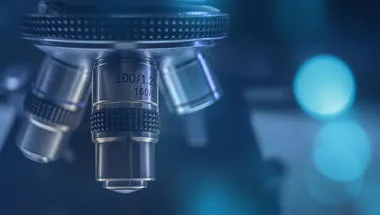
Biological Physics & Soft Matter
The Biological Physics and Soft Matter group aims to use bespoke technology and analytical methods borrowed from the Physical Sciences to address important fundamental questions in Biology.

Biological Physics Across Scales (BiPAS)
The Biological Physics Across Scales Centre for Doctoral Training (BiPAS CDT) is a multi-disciplinary doctoral training programme in biological physics based at King's College London.

London Centre for Nanotechnology
The London Centre for Nanotechnology is a UK-based multidisciplinary enterprise operating at the forefront of science and technology. Its purpose is to solve global problems in information processing, healthcare, energy and the environment through the application of nanoscience and nanotechnology.
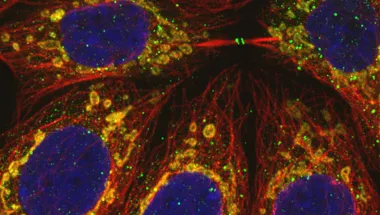
Lipids and Membranes Research Interest Group
A Lipids and Membranes Research Interest Group
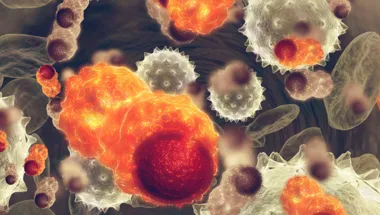
Cancer Biology
Cancer Biology
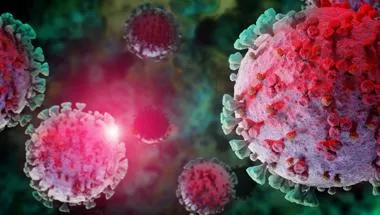
King’s MechanoBiology Centre (KMBC)
The King’s MechanoBiology Centre gives a common platform for researchers across different disciplines with complementary interests in mechanobiology
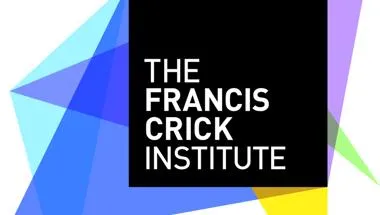
The Francis Crick Institute
King’s is delighted to be a founding academic partner alongside UCL and Imperial College in the Francis Crick Institute, joining the multidisciplinary research expertise from all the Partners together to deliver world-leading biomedical research.
News
King's researchers awarded prestigious European Research Council Advanced Grants
Three leading researchers from King’s College London have been awarded Advanced Grants from the European Research Council (ERC).
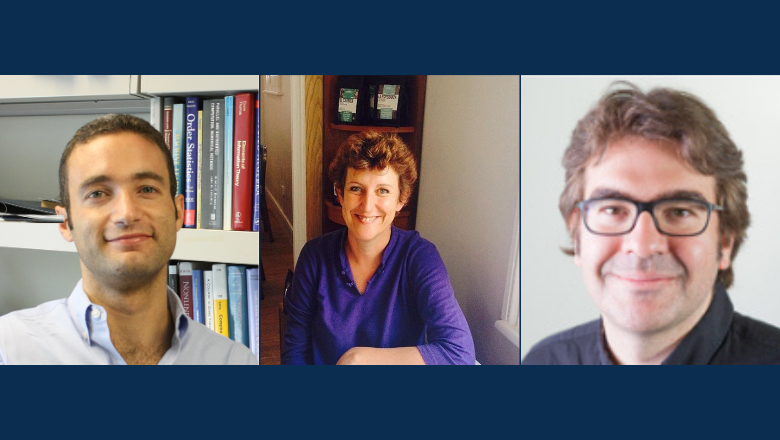
King's research shows 'softer' proteins enter the cell nucleus faster
How soft or rigid proteins are determines how quickly they enter the cell nucleus, according to new research from King’s College London and the Francis Crick...
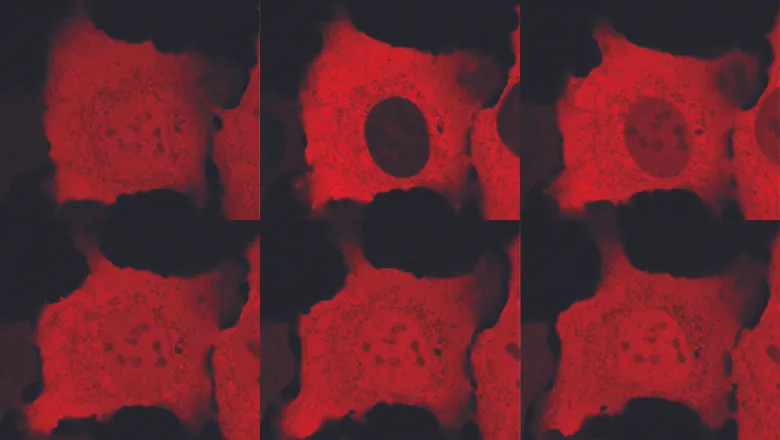
Fundamental research into proteins in the cell membrane receives BBSRC Pioneer Award
The first-of-its-kind exploratory study will examine how force impacts assembly for critical proteins in the body.
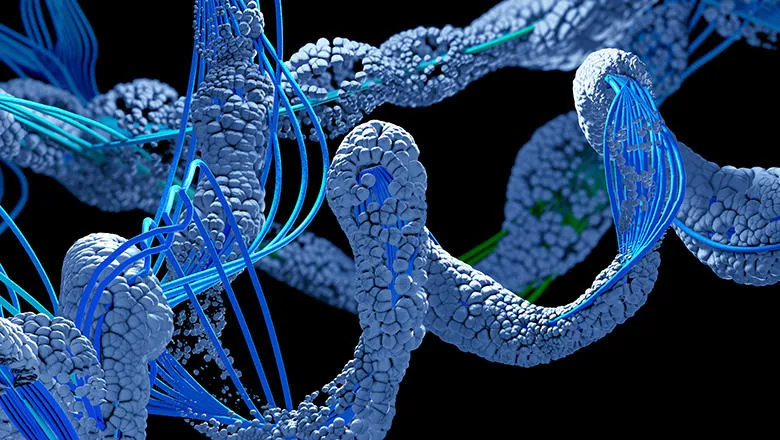
New technique to studying the movements of proteins could reveal insight into age-related diseases
Physicists captured new data on the hidden complexity of protein folding
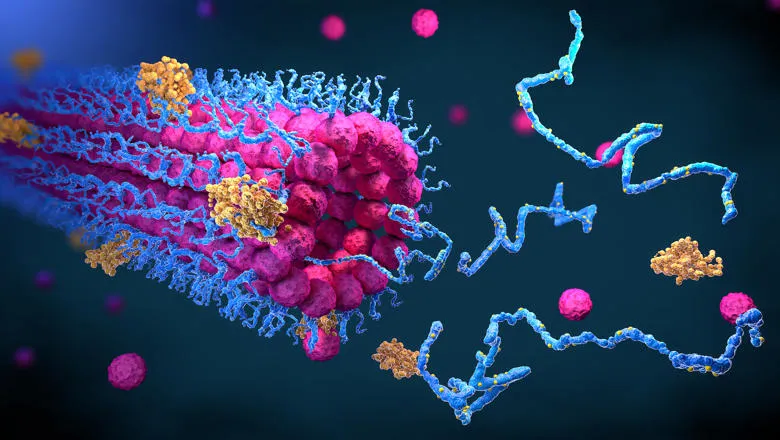
King's Centre for the Physical Science of Life celebrates its launch
The new centre ushers in a new era for physical science
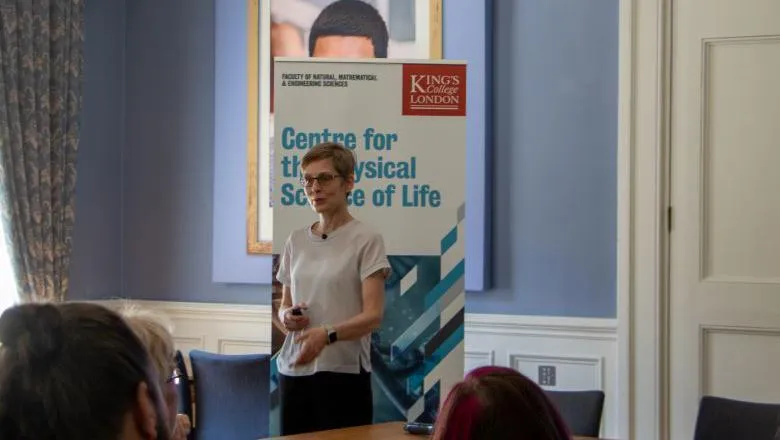
Nanostrand newsletter available for download
Nanostrand is the newsletter for the Photonics & Nanotechnology Group and the Biological Physics and Soft Matter Group in the Department of Physics.
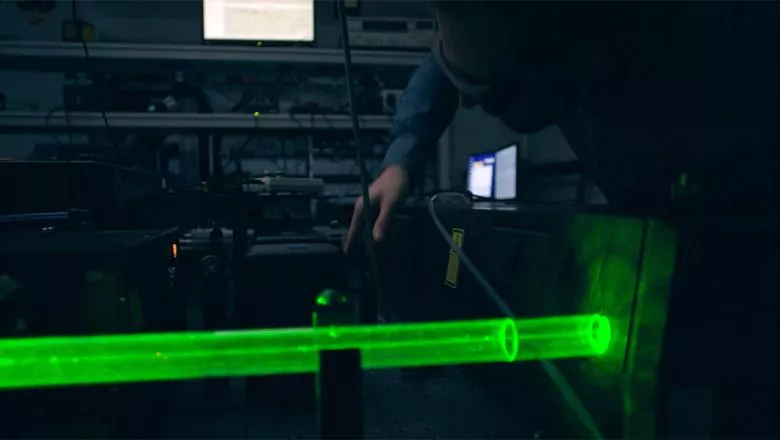
King's awarded multi-disciplinary Mechanobiology doctoral training scheme by Leverhulme Trust
The Mechanics of Life Doctoral Scholarship Programme will draw on King’s research expertise in mechanobiology
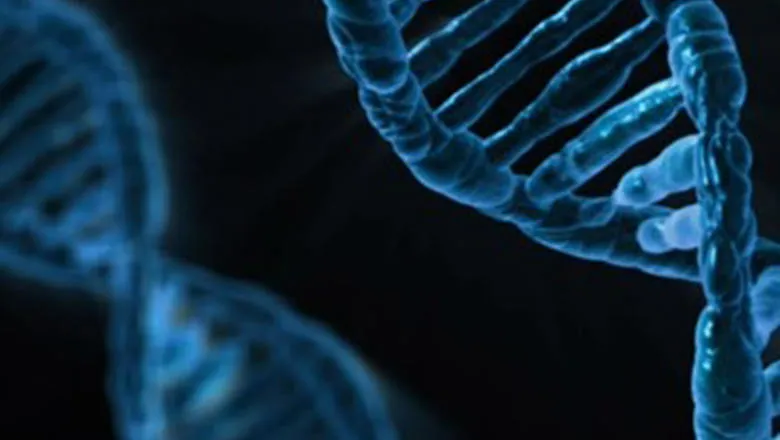
Researchers awarded £3.5m to study how certain cells use and resist force
Researchers have long understood that biochemical signals affect cells, and recently it has been recognised that mechanical forces regulate a wide variety of...
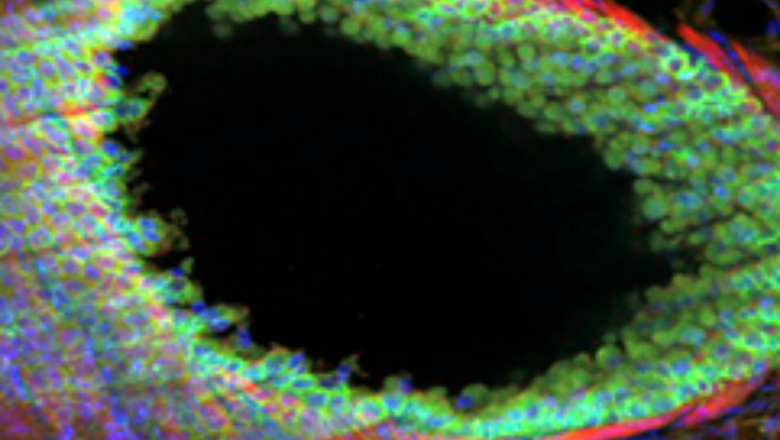
Royal Society Wolfson Fellowships awarded to academic staff in Departments of Physics and Mathematics
Two Royal Society Wolfson Fellowships have been awarded to academic staff in the Faculty of Natural & Mathematical Sciences.

Events

Force Talk: Professor Michael Murrell - Energetic optimization during cell division
A public seminar as part of the Force Talk series exploring mechanobiology, given by Professor Michael Murrell
Please note: this event has passed.

Force Talk: Dr Kenji Sugioka - Mechanical regulation of cytokinesis during embryogenesis
A public seminar as part of the Force Talk series exploring mechanobiology, given by Dr Kenji Sugioka
Please note: this event has passed.
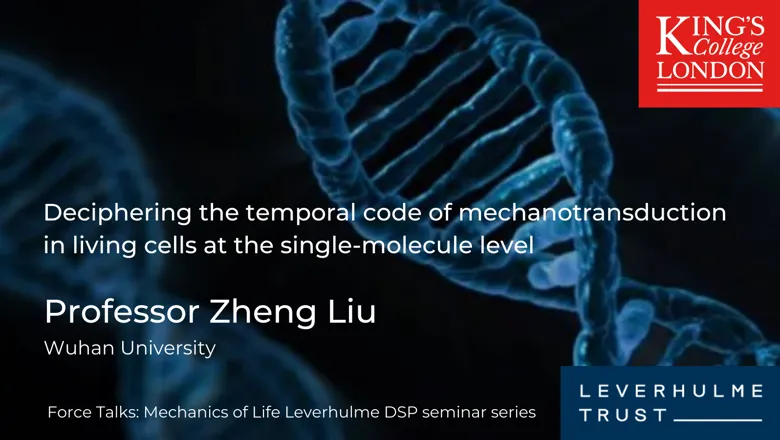
Force Talk: Professor Zheng Liu - Deciphering the temporal code of mechanotransduction in living cells at the single-molecule level
A public seminar as part of the Force Talk series exploring mechanobiology, given by Professor Zheng Liu
Please note: this event has passed.
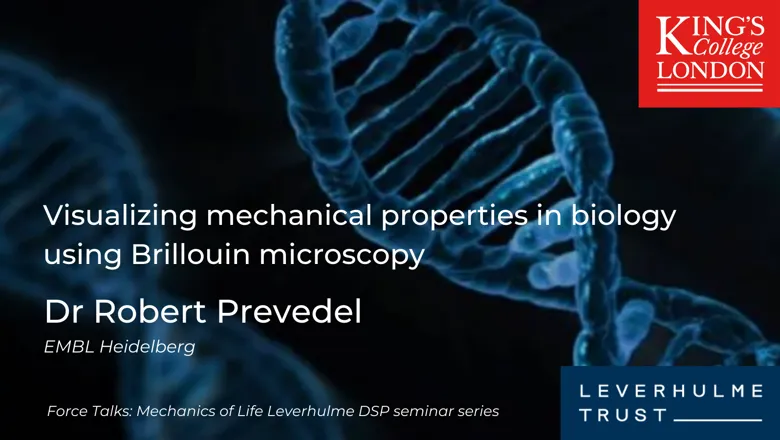
Force Talk: Dr Robert Prevedel - Visualizing mechanical properties in biology using Brillouin microscopy
A public seminar as part of the Force Talk series exploring mechanobiology, given by Dr Robert Prevedel
Please note: this event has passed.
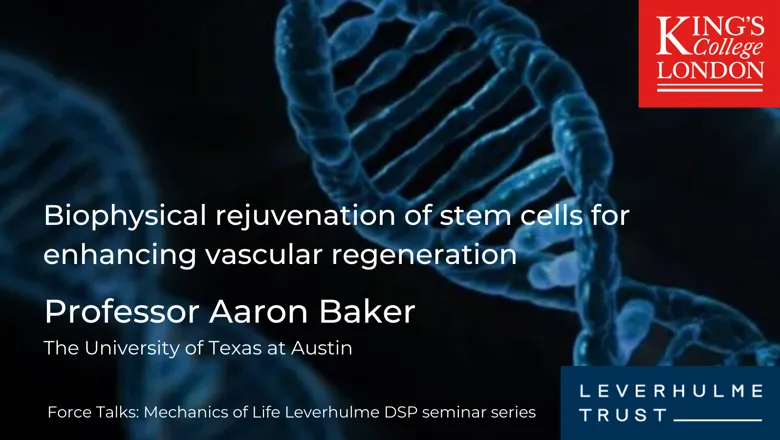
Force Talk: Professor Aaron Baker - Biophysical rejuvenation of stem cells for enhancing vascular regeneration
A public seminar as part of the Force Talk series exploring mechanobiology, given by Professor Aaron Baker
Please note: this event has passed.
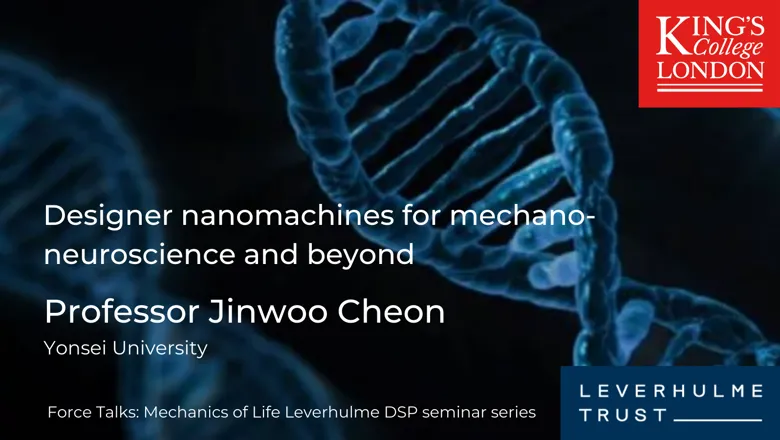
Force Talk: Professor Jinwoo Cheon - Designer nanomachines for mechano-neuroscience and beyond
A public seminar as part of the Force Talk series exploring mechanobiology, given by Professor Jinwoo Cheon
Please note: this event has passed.
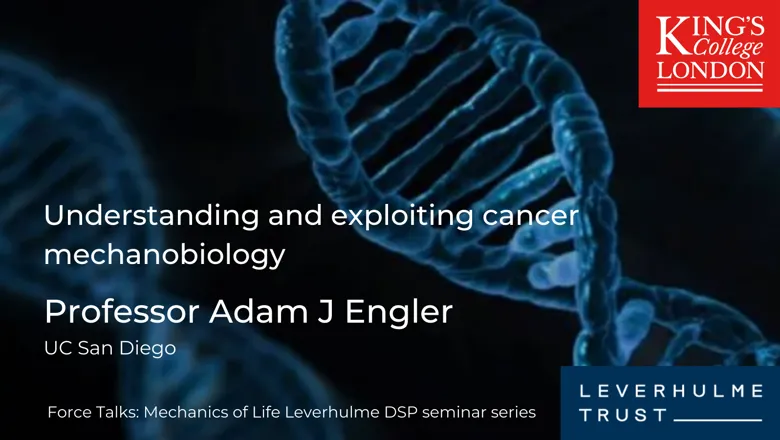
Force Talk: Professor Adam J Engler - Understanding and exploiting cancer mechanobiology
A public seminar as part of the Force Talk series exploring mechanobiology, given by Professor Adam J Engler
Please note: this event has passed.
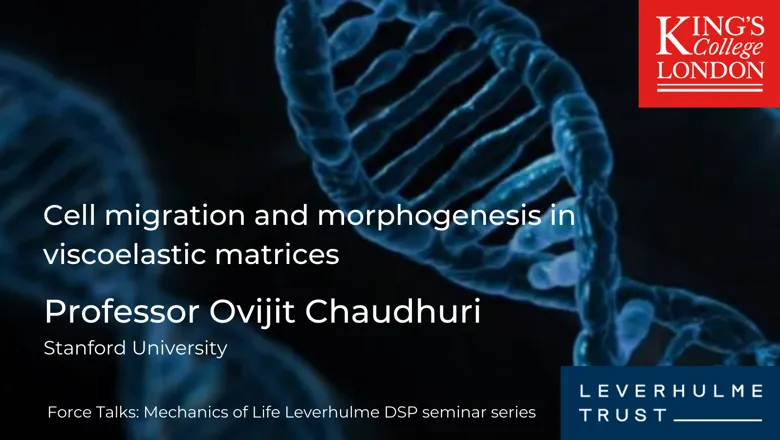
Force Talk: Professor Ovijit Chaudhuri - Cell migration and morphogenesis in viscoelastic matrices
A public seminar as part of the Force Talk series exploring mechanobiology, given by Professor Ovijit Chaudhuri
Please note: this event has passed.
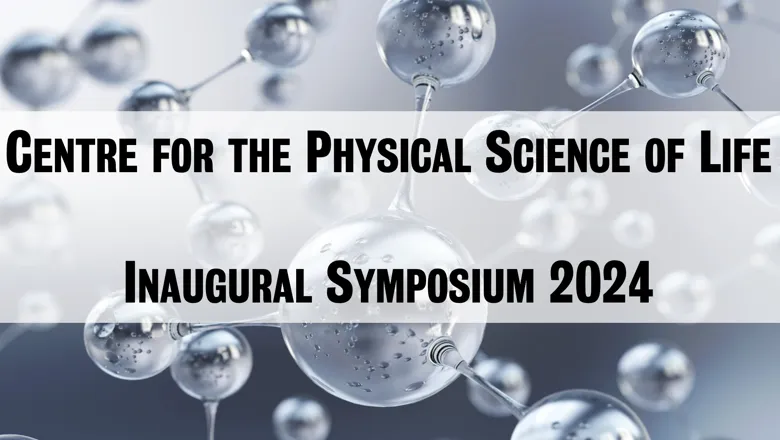
Centre for the Physical Science of Life Inaugural Symposium
Please join us in-person for the Centre for the Physical Science of Life Inaugural Symposium at King’s College London.
Please note: this event has passed.
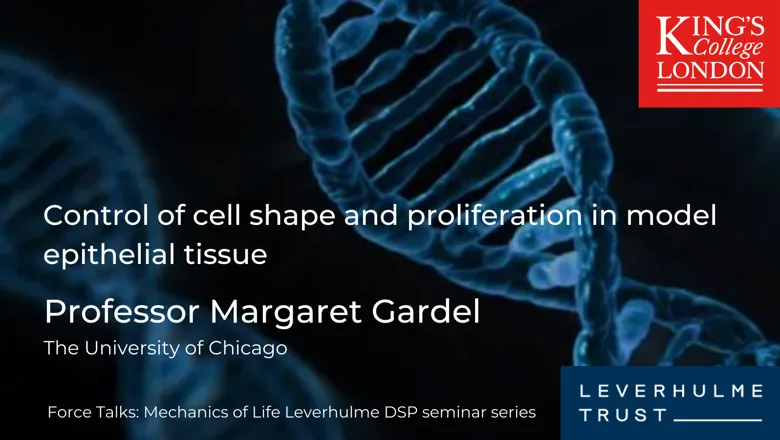
Force Talk: Professor Margaret Gardel - Control of cell shape and proliferation in model epithelial tissue
A public seminar as part of the Force Talk series exploring mechanobiology, given by Professor Margaret Gardel
Please note: this event has passed.
Research

Biological Physics & Soft Matter
The Biological Physics and Soft Matter group aims to use bespoke technology and analytical methods borrowed from the Physical Sciences to address important fundamental questions in Biology.

Biological Physics Across Scales (BiPAS)
The Biological Physics Across Scales Centre for Doctoral Training (BiPAS CDT) is a multi-disciplinary doctoral training programme in biological physics based at King's College London.

London Centre for Nanotechnology
The London Centre for Nanotechnology is a UK-based multidisciplinary enterprise operating at the forefront of science and technology. Its purpose is to solve global problems in information processing, healthcare, energy and the environment through the application of nanoscience and nanotechnology.

Lipids and Membranes Research Interest Group
A Lipids and Membranes Research Interest Group

Cancer Biology
Cancer Biology

King’s MechanoBiology Centre (KMBC)
The King’s MechanoBiology Centre gives a common platform for researchers across different disciplines with complementary interests in mechanobiology

The Francis Crick Institute
King’s is delighted to be a founding academic partner alongside UCL and Imperial College in the Francis Crick Institute, joining the multidisciplinary research expertise from all the Partners together to deliver world-leading biomedical research.
News
King's researchers awarded prestigious European Research Council Advanced Grants
Three leading researchers from King’s College London have been awarded Advanced Grants from the European Research Council (ERC).

King's research shows 'softer' proteins enter the cell nucleus faster
How soft or rigid proteins are determines how quickly they enter the cell nucleus, according to new research from King’s College London and the Francis Crick...

Fundamental research into proteins in the cell membrane receives BBSRC Pioneer Award
The first-of-its-kind exploratory study will examine how force impacts assembly for critical proteins in the body.

New technique to studying the movements of proteins could reveal insight into age-related diseases
Physicists captured new data on the hidden complexity of protein folding

King's Centre for the Physical Science of Life celebrates its launch
The new centre ushers in a new era for physical science

Nanostrand newsletter available for download
Nanostrand is the newsletter for the Photonics & Nanotechnology Group and the Biological Physics and Soft Matter Group in the Department of Physics.

King's awarded multi-disciplinary Mechanobiology doctoral training scheme by Leverhulme Trust
The Mechanics of Life Doctoral Scholarship Programme will draw on King’s research expertise in mechanobiology

Researchers awarded £3.5m to study how certain cells use and resist force
Researchers have long understood that biochemical signals affect cells, and recently it has been recognised that mechanical forces regulate a wide variety of...

Royal Society Wolfson Fellowships awarded to academic staff in Departments of Physics and Mathematics
Two Royal Society Wolfson Fellowships have been awarded to academic staff in the Faculty of Natural & Mathematical Sciences.

Events

Force Talk: Professor Michael Murrell - Energetic optimization during cell division
A public seminar as part of the Force Talk series exploring mechanobiology, given by Professor Michael Murrell
Please note: this event has passed.

Force Talk: Dr Kenji Sugioka - Mechanical regulation of cytokinesis during embryogenesis
A public seminar as part of the Force Talk series exploring mechanobiology, given by Dr Kenji Sugioka
Please note: this event has passed.

Force Talk: Professor Zheng Liu - Deciphering the temporal code of mechanotransduction in living cells at the single-molecule level
A public seminar as part of the Force Talk series exploring mechanobiology, given by Professor Zheng Liu
Please note: this event has passed.

Force Talk: Dr Robert Prevedel - Visualizing mechanical properties in biology using Brillouin microscopy
A public seminar as part of the Force Talk series exploring mechanobiology, given by Dr Robert Prevedel
Please note: this event has passed.

Force Talk: Professor Aaron Baker - Biophysical rejuvenation of stem cells for enhancing vascular regeneration
A public seminar as part of the Force Talk series exploring mechanobiology, given by Professor Aaron Baker
Please note: this event has passed.

Force Talk: Professor Jinwoo Cheon - Designer nanomachines for mechano-neuroscience and beyond
A public seminar as part of the Force Talk series exploring mechanobiology, given by Professor Jinwoo Cheon
Please note: this event has passed.

Force Talk: Professor Adam J Engler - Understanding and exploiting cancer mechanobiology
A public seminar as part of the Force Talk series exploring mechanobiology, given by Professor Adam J Engler
Please note: this event has passed.

Force Talk: Professor Ovijit Chaudhuri - Cell migration and morphogenesis in viscoelastic matrices
A public seminar as part of the Force Talk series exploring mechanobiology, given by Professor Ovijit Chaudhuri
Please note: this event has passed.

Centre for the Physical Science of Life Inaugural Symposium
Please join us in-person for the Centre for the Physical Science of Life Inaugural Symposium at King’s College London.
Please note: this event has passed.

Force Talk: Professor Margaret Gardel - Control of cell shape and proliferation in model epithelial tissue
A public seminar as part of the Force Talk series exploring mechanobiology, given by Professor Margaret Gardel
Please note: this event has passed.
